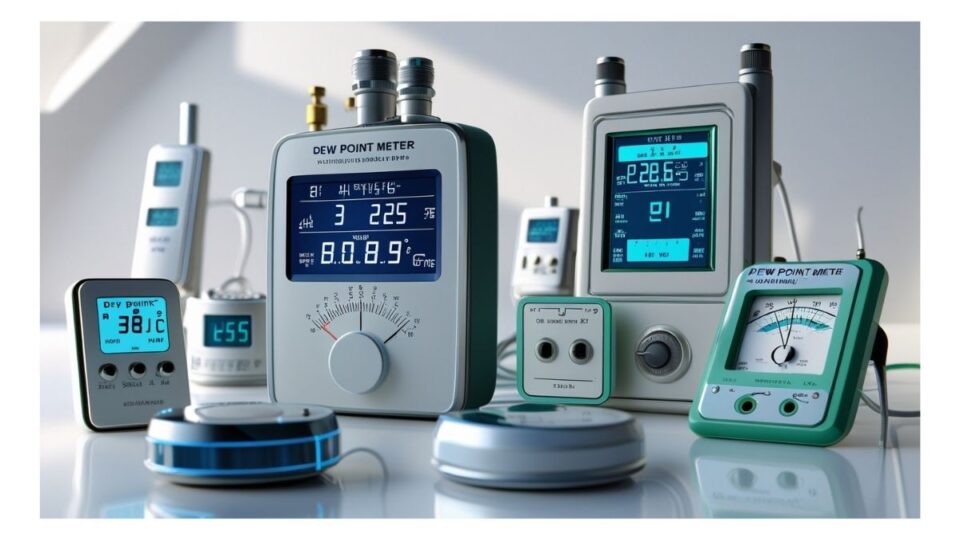Introduction
Imagine stepping outside on a hot summer day — sometimes it feels sticky, while other days it feels dry. What makes the difference? It’s not just the temperature, but the dew point — the exact temperature at which air becomes saturated and moisture condenses into water. This is why dew point meters are so important.
Whether you work in HVAC, industrial manufacturing, food storage, or even meteorology, understanding and measuring dew point helps keep equipment safe, products fresh, and environments comfortable. These devices go beyond simple thermometers or hygrometers because they measure the true moisture content in the air, not just how hot or humid it feels.
In this article, we’ll break down what dew point meters are, how they work, why they matter, and how to choose the best one for your needs.
What Are Dew Point Meters?
A dew point meter is a scientific tool that measures the temperature at which air becomes fully saturated with moisture. At this point, condensation forms — think of fog on your car window or droplets on a cold soda can.
Unlike regular humidity sensors, dew point meters give a more precise reading of actual water vapor in the air. This makes them critical for industries like:
- HVAC and climate control – ensuring indoor comfort and avoiding mold growth.
- Compressed air systems – preventing rust and water buildup inside pipes.
- Food storage and pharmaceuticals – keeping products dry and safe.
- Meteorology and research labs – studying weather and environmental conditions.
Why Measuring Dew Point Matters
If humidity is left unchecked, it can cause corrosion, spoilage, or unsafe working conditions. A dew point meter provides actionable data that prevents costly damage.
For example:
- In a compressed air system, even a small amount of moisture can damage tools and cause production downtime.
- In cold storage facilities, monitoring dew point ensures food stays fresh without freezer burn.
- In museums, controlling dew point protects priceless artifacts from mold and decay.
Simply put, dew point meters keep environments safe, efficient, and reliable.
Types
Not all dew point meters are the same. The right one depends on your industry and accuracy needs.
1. Chilled Mirror Dew Point
These are highly accurate instruments that use a mirror surface to detect condensation. They’re often used in laboratories and calibration centers.
2. Capacitive Sensor Dew Point Meters
These use sensors that measure changes in electrical properties caused by moisture. They’re compact, affordable, and widely used in HVAC and industrial applications.
3. Portable Dew Point Meters
Handheld devices designed for field engineers. They are lightweight and give fast readings on-site.
4. Online/Continuous Monitoring Systems
Installed permanently in factories or storage facilities, these systems provide constant dew point monitoring and data logging.
Dew Point Meters: Seating Guide for Buyers
Just like choosing the best seat in a concert hall, selecting the right dew point meter depends on your view — or in this case, your measurement needs. Below is a quick “seating chart” to help you compare.
| Type | Best For | View/Accuracy Description |
| Chilled Mirror | Labs, calibration centers | Highest accuracy, premium “front row seats” |
| Capacitive Sensor | HVAC, manufacturing | Reliable mid-tier choice, good balance of price & performance |
| Portable | On-site engineers | Flexible and mobile, “general admission” but versatile |
| Online Monitoring | Industrial systems | Continuous control, like VIP box seating for full visibility |
How to Choose the Best Dew Point Meter
When shopping for a dew point meter, consider these tips:
- Accuracy level – For high-precision industries, chilled mirror devices are best. For general use, capacitive sensors are often enough.
- Measurement range – Check if the meter covers your working temperature and humidity conditions.
- Portability – Field engineers may prefer lightweight handheld devices.
- Connectivity – Some models offer digital logging and wireless data transfer for real-time monitoring.
- Budget – Prices range from a few hundred dollars to several thousand, depending on features.
Accessibility and Special Features
Many modern dew point meters come with user-friendly features like touchscreen displays, USB connectivity, and rugged waterproof designs. This makes them accessible for both professionals and beginners.
For specialized industries, such as aerospace or semiconductor manufacturing, advanced dew point meters can detect ultra-low moisture levels (down to –100°C dew point), ensuring that sensitive equipment runs flawlessly.
Final Thoughts
A dew point meter is more than just a scientific gadget — it’s a powerful tool that helps protect products, equipment, and environments from the damaging effects of moisture. From HVAC technicians ensuring indoor comfort to industries safeguarding multi-million-dollar machinery, these devices are essential for accuracy and reliability.
When choosing the best dew point meter, think about your application, accuracy needs, and budget. Much like picking the right seat at a concert, the choice comes down to how good a “view” (or measurement) you need.
FAQs
1. What’s the difference between a hygrometer and a dew point meter?
A hygrometer measures relative humidity (how “humid” it feels), while a dew point meter measures the exact temperature where moisture condenses. Dew point is usually more accurate for industrial needs.
2. Are dew point meters expensive?
They range from affordable portable devices ($300–$600) to high-end laboratory models ($2,000+). Your choice depends on accuracy requirements.
3. Can I use a dew point meter at home?
Yes! While more common in professional settings, home users can use portable versions to monitor indoor air quality and avoid mold growth.
4. How often should I calibrate a dew point meter?
Manufacturers recommend calibration once a year for accuracy, especially in critical industries.
5. Where can I buy reliable dew point meters?
Trusted suppliers include Omega Engineering, Michell Instruments, and Instrumart. Always check specifications before purchasing.

